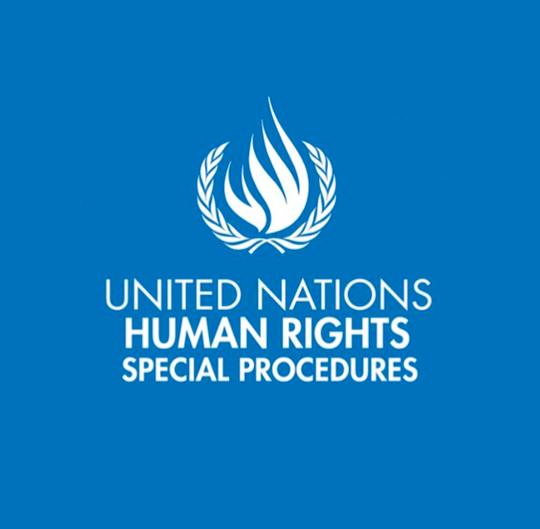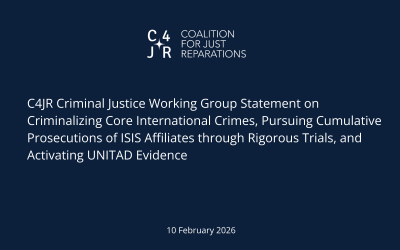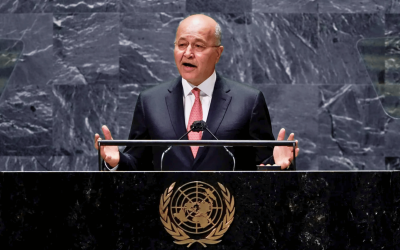In July, the UN Special Rapporteur on the promotion of truth, justice, reparation, and guarantee of non-recurrence together with other Special Procedures, with the mandate to address human rights issues covered by the Yazidi [Female] Survivors Law (YSL), made public a follow-up communication sent to Iraqi authorities regarding the imposition of a criminal complaint requirement under the YSL. The UN Special Procedures holders noted that the requirement is inconsistent with the YSL as a non-judicial domestic reparations programme, in a letter sent on 10 May 2023 (AL IRQ 3/2023) and made public sixty days later. They further noted that the requirement was not in line with international standards and that such a requirement would have adverse effects on the implementation of the YSL.
UN Special Procedures holders including the Working Group on Enforced or Involuntary Disappearances, the Special Rapporteur on extrajudicial, summary or arbitrary executions, the Special Rapporteur on the independence of judges and lawyers, the Special Rapporteur on minority issues, the Special Rapporteur on the promotion and protection of human rights and fundamental freedoms while countering terrorism, the Special Rapporteur on torture and other cruel, inhuman or degrading treatment or punishment, the Special Rapporteur on violence against women and girls, its causes and consequences, and the Working Group on discrimination against women and girls, responded to information received concerning the recent imposition of additional requirements for survivors to file a criminal complaint to be eligible for reparation under the YSL, and associated by-laws, addressed to victims of the Islamic State of Iraq and the Levant (ISIL) from the Yazidi, Christian, Turkmen, and Shabak communities, which substantially impair the realisation of the rights of survivors to reparation as stipulated under the law and international standards.
“In a previous joint communication by the Special Procedures mandate holders to your Excellency’s Government sent on 15 September 2022 (AL IRQ 3/2022), we have noted the progress achieved towards recognizing and redressing the gross human rights violations (including sexual violence, enforced disappearance, torture, slavery, and killings) suffered by Yazidi, Christian, Turkmen, and Shabak communities through the adoption of the YSL of March 2021 and its regulations of September 2021,” the communication read. “However, we urged the relevant authorities to adopt the necessary measures to ensure their effective and prompt implementation to guarantee access to justice and reparations to victims, and expressed concern regarding a series of challenges encountered in their implementation process. We regret that to date we have not received a response to the communication.”
The letter noted that, “The new requirements substantially impair the realizaiton of the rights of victims and survivors to reparation as stipulated under the YSL and international standards.” The requirement means that survivors must file criminal complaints and submit investigation documents with their YSL applications, and was introduced by the Committee established under the auspices of the Ministry of Labor and Social Affairs (MOLSA) to evaluate applications under the YSL. There are justifiable concerns that this decision and the subsequent need to file a criminal complaint is preventing eligible survivors from applying for benefits under the YSL, including survivors based abroad, and child survivors.
“We are further concerned that requiring survivors and victims to file a criminal complaint is unduly onerous and in violation of international standards requiring States to guarantee that they are treated with humanity and respect for their dignity, to adopt appropriate measures to ensure their safety, physical and psychological well-being and privacy, and to ensure to the extent possible that victims and survivors benefit from special consideration and care to avoid re- traumatization in the course of legal and administrative procedures designed to provide justice and reparation,” the communication continued. “Administrative reparation programmes must aim at reducing survivors’ and victims‘ exposure to stigma and re-traumatization and at guaranteeing their wellbeing throughout the administrative process. There are significant obstacles that prevent survivors and victims from reporting cases, including trauma and fears that exposure will lead to stigmatisation or further violence.”
The Government of Iraq (GOI) has yet to respond to the communication.
For more information, the full text of both letters can be found here:



